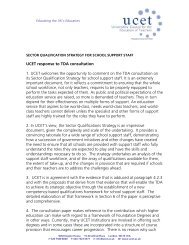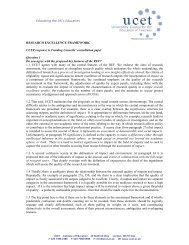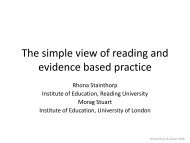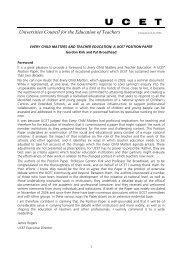The School Curriculum Ten Years Hence - UCET: Universities ...
The School Curriculum Ten Years Hence - UCET: Universities ...
The School Curriculum Ten Years Hence - UCET: Universities ...
Create successful ePaper yourself
Turn your PDF publications into a flip-book with our unique Google optimized e-Paper software.
and ‘work related learning’ - not that these are themselves<br />
unimportant but so that we do not lose sight of the key principles of<br />
good teaching and learning.<br />
We must not forget that far too many of our young people fail to<br />
achieve to their potential. Too many disengage from learning during<br />
the secondary years and present a very considerable challenge to<br />
schools and teachers to re-engage. Experience of failure and lack of<br />
support, from peers, family or the wider community, can be<br />
intensely demotivating for pupils in our schools, particularly those<br />
from homes where education is less strongly valued.<br />
In our recent report Improving City <strong>School</strong>s (OFSTED 2000a), HMI<br />
identified some of the key features of the teaching in those schools<br />
that are most successful in tackling these problems of<br />
underachievement and disengagement. <strong>The</strong> report says:<br />
Teaching has to be especially well-planned, systematic and<br />
incremental. Work must be purposeful and within the capability of<br />
pupils, but it must also move them on in knowledge and<br />
understanding. This is a critical factor where pupils’ motivation, selfbelief<br />
and capacity to organise themselves can be low - notably, but<br />
not only, on the part of some boys. <strong>The</strong> impact on the classroom<br />
climate of poor concentration and sometimes poor behaviour by<br />
even a handful of pupils can be debilitating; astute management<br />
and considerable stamina are needed to deal effectively with them.<br />
This report goes on to identify a number of key features of effective<br />
teaching in these schools:<br />
• an insistence that pupils will do their best, coupled with support<br />
that enables them to meet the challenges set<br />
• sustained interaction by teachers with pupils, including the skilled<br />
use of questions and the call for pupils to articulate their thinking<br />
• clear and uncomplicated classroom routines<br />
• good use of time and resources, a premium placed on maintaining<br />
concentration and pace<br />
• use of assessment to target action to address individual learners’<br />
needs<br />
• skilful use of support teachers and/or support assistants to create<br />
flexibility in grouping and to target individuals or groups for<br />
intensive support<br />
<strong>The</strong>se are not only, of course, the features of effective teaching in<br />
disadvantaged city schools only but apply more generally - it is just<br />
that they are more crucial to success in these schools. <strong>The</strong><br />
individual learner must always be a key focus for the teacher but<br />
especially so where, for whatever reason, the learner is in danger of<br />
disengaging.






